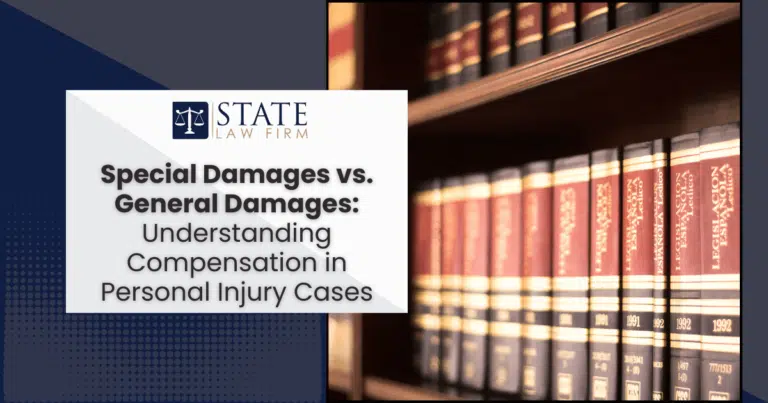When someone is injured due to someone else’s negligence, the aftermath isn’t just physical—it’s often financial, emotional, and deeply personal. Whether it’s mounting medical bills, lost time at work, or the long-term impact of pain and suffering, personal injury claims exist to help victims recover the compensation they deserve. But navigating the world of damages in these cases can feel overwhelming without a solid understanding of what those terms actually mean.
In 2022 alone, there were over 62 million injury-related visits to physician offices, emergency departments, and hospitals across the United States, according to CDC data. With personal injury claims being so common, understanding how damages are calculated—and more importantly, how to differentiate between special and general damages—can make all the difference in the outcome of your case.
At State Law Firm, we’re a boutique personal injury practice based in Sherman Oaks, California. Our team of young, driven attorneys is passionate about helping clients take on difficult cases and fight for every dollar they are entitled. In this guide, we’ll break down the two major categories of compensation in personal injury law—special and general damages—so you can better understand how they work, how they’re calculated, and why having a skilled personal injury attorney in your corner can significantly impact your recovery.
Introduction to Damages in Personal Injury Law
When you’ve been hurt because of someone else’s actions, the law gives you a way to seek compensation. This compensation—referred to as damages—is meant to make you “whole” again, or at least as close to whole as possible. In personal injury law, damages are broken down into categories that reflect both the visible and invisible toll an accident takes on your life.
Generally, personal injury damages fall into two key categories:
- Special Damages: Quantifiable financial losses.
- General Damages: Intangible, non-economic losses.
These legal terms aren’t just for attorneys—they directly impact how much you may receive in a settlement or court award. Whether you’ve been in a car accident, suffered a slip and fall, or dealt with a workplace injury, understanding the types of damages available is the first step toward recovering what you’re owed.
Pro Tip: Insurance companies often focus on special damages because they’re easier to quantify, but general damages are just as critical and often require legal advocacy to be fully recognized.
What are Special Damages?
Special damages—also known as economic damages—cover the tangible, out-of-pocket costs associated with your injury. These are the types of losses you can document with receipts, invoices, or pay stubs. If your injury has caused a financial burden, this is where those costs are captured.
Examples of special damages include:
- Medical expenses (past, present, and future)
- Lost wages due to missed work
- Loss of future earning capacity
- Physical therapy and rehabilitation costs
- Out-of-pocket expenses such as transportation to medical appointments or the cost of hiring help at home
The key to recovering these damages? Documentation. Every bill, every missed paycheck, and every expense tied to your injury should be saved and organized.
Pro Tip: Keep a running log of every medical visit and expense related to your injury. It’s a small habit that can make a big impact on the strength of your case.
The Role of General Damages in Personal Injury Cases
While special damages speak to the financial side of an injury, general damages tell the human story—what the injury has cost you emotionally, mentally, and in your day-to-day quality of life.
General damages can include:
- Pain and suffering
- Emotional distress or trauma
- Loss of enjoyment of life
- Loss of consortium (impacts on relationships)
Unlike special damages, general damages don’t come with receipts. That’s why they often require a skilled attorney to articulate their full value. These are the damages that insurance companies love to downplay—and where a strong legal voice can help you be heard.
Pro Tip: Journaling your symptoms, pain levels, and how your daily life has changed can be powerful evidence when pursuing general damages.
Key Differences Between Special and General Damages
Although both special and general damages are meant to compensate you, they do so in very different ways. Here’s how they compare:
| Feature | Special Damages | General Damages |
| Type | Economic | Non-economic |
| Proof Required | Receipts, bills, pay stubs | Testimony, expert opinions, personal narratives |
| Examples | Medical bills, lost income | Pain and suffering, loss of enjoyment of life |
| Calculable? | Yes, precise dollar amounts | Estimated based on severity and impact |
Why it matters: Juries and insurance adjusters weigh these categories differently. A well-presented case needs to address both types of damages thoroughly to avoid leaving money on the table.
How to Calculate Special and General Damages for Your Claim
Calculating damages is both an art and a science. While special damages can often be added up with a calculator, general damages require persuasive storytelling, expert input, and legal know-how.
For special damages:
- Gather all medical bills, receipts, and income documentation
- Track missed workdays and calculate lost income.
- Include future costs supported by medical opinion.s
For general damages:
- Use multiplier methods (where general damages are calculated as a multiple of special damages)
- Consider per diem models (assigning a daily value to your suffering)
- Support your claim with medical experts, therapists, or personal testimony
Pro Tip: Your attorney can help you avoid undervaluing your claim. Many victims settle too early or without understanding how to value future or long-term damages.
The Importance of Hiring a Lawyer for Damage Claims
Insurance companies have one job: limit payouts. Without legal representation, it’s easy to feel pressured into accepting a lowball offer—especially when bills are stacking up. That’s where we come in.
At State Law Firm, we help clients:
- Understand the full scope of their damages—economic and non-economic
- Build strong, evidence-based claims
- Handle negotiations with insurance adjusters
- Work with medical professionals and experts to support complex claims
- Take cases to court if a fair settlement isn’t offered
We’re a boutique firm of driven young attorneys who take pride in taking on tougher cases and getting real results. Whether your case involves a fender bender or life-altering injuries, we bring the same fire to the fight because you deserve nothing less.
Pro Tip: The earlier you involve an attorney, the better. Time-sensitive evidence like witness statements and video footage can make or break a claim.


